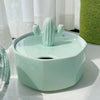The Mystery Behind Cat Sneezes
When your feline friend starts to **sneeze**, it can be cute at first, but persistent sneezing is often a sign that should not be overlooked. Cats, like humans, sneeze for a variety of reasons. While an occasional sneeze is usually harmless, frequent sneezing can indicate underlying health issues that may require attention. Understanding why your cat might be sneezing involves diving into several potential causes, which range from environmental factors to **infectious** diseases.
Common Causes of Sneezing in Cats
Allergies
Allergies are a common reason for sneezing in cats. Just like humans, cats can be allergic to a variety of substances, including pollen, dust, and mold. When cats inhale these **allergens**, their immune system reacts by producing histamines, leading to sneezing to expel these irritants from their nasal passages. Vous might notice additional symptoms like itching, watery eyes, or even coughing.
Respiratory Infections
Cats are susceptible to upper respiratory infections (URIs), which are a leading cause of sneezing. These infections are often caused by viruses such as the feline herpes virus or calicivirus. Both can cause symptoms similar to a human cold, including sneezing, nasal discharge, and fever. It's important to note that URIs are contagious, particularly in environments with many cats, such as shelters or multi-cat households.
Foreign Bodies and Irritants
In some cases, a foreign object lodged in the nasal passages or exposure to irritants such as cigarette smoke, perfumes, or cleaning chemicals can trigger sneezing in cats. Cats, who are naturally curious creatures, might inhale grass seeds, hair, or small debris which can cause discomfort, prompting them to sneeze as an attempt to clear the blockage.
The Role of the Environment
Environmental factors play a significant role in your cat's respiratory health. Indoor air quality can influence how often your cat sneezes. Ensuring that your home is free from excessive dust and keeping your kitty away from smoking areas can help minimize sneezing triggered by environmental factors. Regularly changing air filters and using air purifiers may also contribute to cleaner air for your feline friend.
When to Consult the Veterinarian
If your cat's sneezing persists more than a few days, is accompanied by other symptoms like lethargy or loss of appetite, or if there's blood in the nasal discharge, it's crucial to seek veterinary advice. A veterinarian can perform a comprehensive examination, which might include blood tests, X-rays, or even nasal swabs to determine if there is a serious underlying issue requiring treatment.
Conclusion: Maintaining Your Cat's Health
In conclusion, understanding the potential causes of why your cat is sneezing is vital for maintaining their overall health. While occasional sneezing is normal, ongoing sneezing warrants closer attention and potential veterinary intervention. Ensuring a clean environment and observing any changes in behavior or symptoms are crucial steps in addressing your cat's sneezing effectively and ensuring a healthy, happy pet.


































